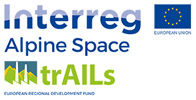Project information
Project title: Alpine Industrial Landscapes Transformation - TrAILs
Duration: 36 month / 17th April 2018 to 31st March 2021
Project partners:
- Lead partner: Technical University Munch, Freising, Germany
- Project partner 2: BSC, Business support centre Ltd. Kranj, Slovenia
- Project partner 3: University of Verona, Italy
- Project partner 4: Polytechnic University of Milan, Italy
- Project partner 5: TU Wien (Vienna University of Technology), Austria
- Project partner 6: LAMORO Development Agency Asti, Italy
- Project partner 7: University of Ljubljana, Biotechnical Faculty, Slovenia
- Project partner 8: Architecture, Urbanism and Environment Council of Vaucluse department, Avignon, France
- Project partner 9: E-institute, institute for comprehensive development solutions Ptuj, Slovenia
- Project partner 10: Registered association Styrian Iron Route (VESTE) Eisenerz, Austria
Summary
Alpine heavy industry (mining, steelmaking, chemical industry, etc.) is rapidly declining, leaving behind “Alpine Industrial Landscapes” (AILs), huge former productive landscapes of significant size, diffusion and complexity. At present, no reliable quantification of such areas exists and significant transformation attempts or conversion strategies have not been developed. The potential value of AILs was hardly mentioned in previous alpine development programmes and institutional project reports.
The project aims to generate specific knowledge about AILs, to develop and test sustainable transformation strategies, transferable to other industrial landscapes all over the alpine region. In a multidisciplinary, transnational approach the project combines expertise in fields like spatial and landscape planning, socio-economic sciences, regional development etc. while directly cooperating with local communities on relevant case studies (pilot areas).
The project covers four main phases:
- macro-regional survey of AILs and implementation of a web GIS platform;
- comprehensive assessment of AILs actual condition, background and context through on-site analysis of selected Pilot Areas;
- joint evaluation of AILs transformation potential and test-design in cooperation with local stakeholders;
- synthesis and discussion of generated knowledge (processes, methods, tools) with observers, regional/national stakeholders and experts in a conclusive AILs Forum.
The project will support local and regional stakeholders in the sustainable AILs transformation, providing them with practical recommendations for immediate action and clear strategic planning tools for the future.
Project overall objectives
The project’s overall objective is to develop a common and highly transferable transformation strategy for AILs, evidencing and sustainably exploiting their potential in terms of cultural heritage, ecological connectivity, land-use planning and socio-economic regeneration. The sustainable transformation of AILs is especially important for the improvement of the living conditions for man and nature in the Alps because AILs are often located in key positions within the alpine environmental and infrastructural network. In addition, the aim is to enhance the unique, very valuable but partly underestimated cultural and natural heritage of the Alpine region, while reinforcing the regional identity around former industrial areas.
Project results
- Increased general awareness of AILs a key resource for regional sustainable development (knowledge transfer).
- Strengthened transnational Alpine identity by established cross-border cultural infrastructures, cooperatively managed by the alpine countries.
- Intensified interaction and cooperation among development organisations, protecting and developing cultural (industrial) heritage.
- New transnational development options e.g. between neighbouring communities/ regions based on exchange of transformation experiences during test planning process (networking).
- Well prepared transformation actors and qualified ‘regional conversion pilots’ due to new training tools (study module "trAILs").
Project website: http://www.alpine-space.eu/projects/trails
![]() Project trAILs Newsletter 1 (17.2 Mb)
Project trAILs Newsletter 1 (17.2 Mb)
![]() Project trAILs Newsletter 2 (8.8 Mb)
Project trAILs Newsletter 2 (8.8 Mb)
![]() Project trAILs Newsletter 3 (5.3 Mb)
Project trAILs Newsletter 3 (5.3 Mb)
TrAILs is supported by the INTERREG Alpine Space Programme of the European Regional Development Fund (ERDF). Total co-financing amounts to 1,859.290,24 EUR



